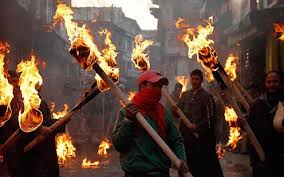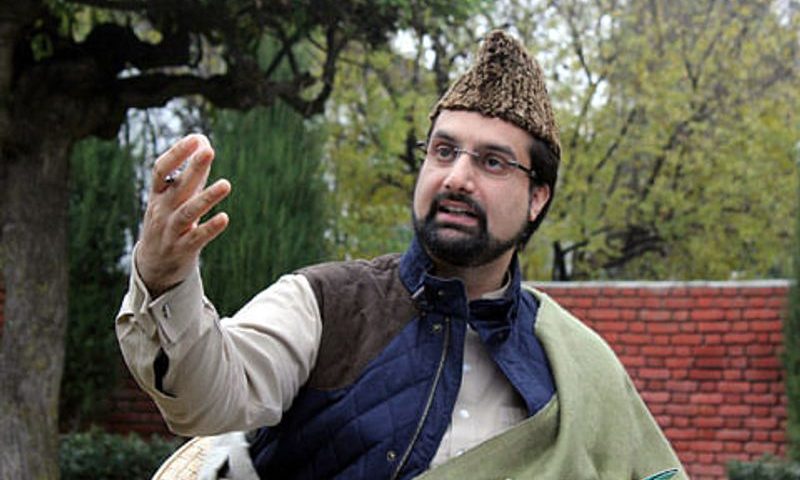- In Kulgam village, people keep hammer by their bed
- “In Sholay (the Bollywood blockbuster movie), people would fear ‘Gabbar’ and here our children fear Police and other forces.”
 Continuous nocturnal raids by forces have created a mayhem-like situation across Kashmir while people remain awake during nights to foil the arrest bids.
Continuous nocturnal raids by forces have created a mayhem-like situation across Kashmir while people remain awake during nights to foil the arrest bids.
The raids, conducted jointly by army, police and CRPF, have forced hundreds of youth to go into hiding, though hundreds have already been arrested on charges of stone-pelting and allegedly participating in street protests.
Reports from Kashmir areas said people remain awake to foil the nocturnal police raids. “We remain awake during nights. Once the forces arrive, we raise an alarm and ask people to come out and protest,” Suhail Ahmad, a resident of Noorabad area in South Kashnir’s Kulgam district, said. He said about 40 youth of Noorabad and its adjoining areas have so far been arrested by police in “random raids.”
In Srinagar district, night protests have erupted at several places to foil forces’ raids. In Padshahibagh area, massive protests erupted three days ago after police raided the area at around 12.30 am. “As soon cops arrived, people made announcement on loudspeakers and held protests, forcing them to retreat,” locals said.
Similar scenes were reported from Hyderpora and several other localities of Srinagar.
Residents of South Kashmir’s Shopian said police, army and CRPF have “let lose reign of terror” in several localities there. “During night raids, the forces beat people, damage property and even hurl teargas shells into residential houses to terrify people to not protest,” they said.
Residents of Bogam and some other areas of Kulgam said they have been “fighting” the nocturnal raids for the past two months. “During protests at night, scores of people have been injured,” they said.
They said forces disconnect electricity in their localities during night to carry out the raids.
“Even a transformer was damaged by forces during a nocturnal raid in the area,” they added.
Similar reports have been constantly coming in from Anantnag, Awantipora, Kupwara, Bandipora, Baramulla, Sopore and other areas of Kashmir.
“After dusk, local mosques remain abuzz with freedom ‘taranas’ and people keep a night vigil to foil forces’ attempt to raid the localities,” Showkat Ahmad, a resident of Palhalan in Baramulla said.
Police said though they have caught some youth red-handed while participating in street protests, they are facing a stiff resistance to pick them up during night raids. “The people pour out on roads in large numbers during nights to foil the arrests,” admitted Superintendent of Police of a Kashmir district. “During the night, if people get an inkling of a raid, they instantly raise an alarm and even announce through mosques that people should come on roads to prevent youth from being detained.”
He said the idea behind night raids is to catch people unawares. “Every village can’t sit on road every night and based on the list we have prepared, we carry out the raids,’’ the police officer said.
Meanwhile, local news agency CNS said on Thursday that people in Harwan and its adjoining localities staged day-long protests against arrest of some youth by police on charges of ‘stone pelting’, during nocturnal raids.
Chanting pro-freedom and pro-justice slogans, hundreds of people including men, women and children from Shalimar, Arabal and Chandpora areas this morning hit the streets and held protests on main road against the police action.
The protesters alleged that police arrested 10 youth in these localities during nocturnal raids.
“The youth detained are either students or laborers having no involvement in stone-pelting or anti-India protests,” they said.
Majority of people in south Kashmir’s Kulgam district keep hammer by their bed as a “security tool” to safeguard themselves from the nocturnal raids of forces.
Rumi, a resident of Kilam area of Kulgam, whose brother was injured in the firing by forces, says, “In my village, people are scared of nocturnal raids conducted by the forces.”
She says the villagers become vigilant as soon as the sun sets.
“They keep hammers and knives with them as tools of self defense,” Rumi says. “In Sholay (the Bollywood blockbuster movie), people would fear ‘Gabbar’ and here our children fear Police and other forces.”
Rumi, who is attending her injured brother at SMHS hospital, says, “Fear psychosis has gripped kids who have spent many nights on roads fearing reprisal from Police.”
According to her, children used to making noise and mischief have suddenly become mute due to the fear of seeing somebody killed.
Since the ongoing uprising started in Kashmir on July 9, a day after the killing of Hizb-ul-Mujahideen commander, Burhan Muzaffar Wani, Kulgam has emerged as one of the most volatile areas in the Valley.
Dozens of people have been killed in the firing by Police and paramilitary forces while hundreds have been left injured, many blinded and maimed.
Muhammad Shafi Khan, a resident of Kund, Kulgam says, “We want freedom and we protest and pelt stones for our rights in the broad daylight but the forces barge into our homes in the death of night and beat the inmates.”
Blaming the government forces of blinding a generation of youth in Kulgam, Khan says, “Nights are safer for the forces as they know no one will pelt stones at them during at night and come in jeeps and start abusing people, beating whosoever comes their way and detain young boys.”
Stressing that it was tough living in Kulgam these days, Khan says, a couple of days back, a spoon fell from my wife’s hand and we panicked thinking police had barged into our house.
“Due to the reign of terror let loose by the forces, we get scared even if somebody in the neighborhood coughs at night,” he says. “For this very reason, we keep hammers by our bedside.”
According to Khan, whose son has qualified the KAS exams, everyone in Kulgam – literates and illiterates, men and women, boys and girls have been participating in protests.
Rafiqa, another resident of Kilam, Kulgam, says some pregnant women in her neighbourhood come out of their homes for their safety.
“They are already in a state of mental trauma,” she says.
Summing up their worries, Rafiqa says, “What will happen to the new born? What will happen to the new born?”






